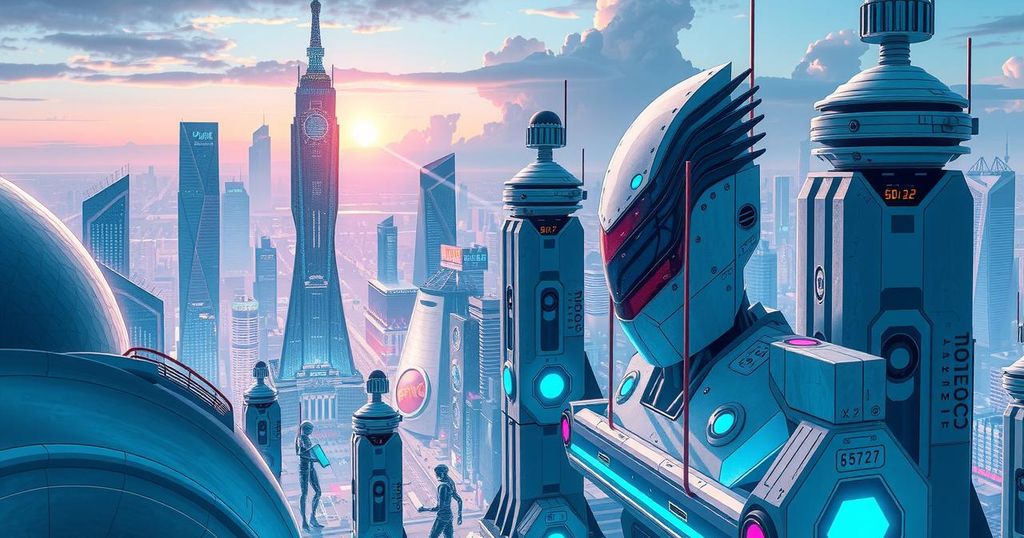Experts Weigh In on AI’s Job Impact: Opportunities or Job Losses?
The debate over AI’s impact on jobs is intensifying as experts share contrasting views. Dario Amodei predicts major job losses, while others like Jensen Huang and Yann LeCun emphasize new opportunities for growth. Key figures in AI point to both the risks and potential benefits of this technology. Adaptability and education are highlighted as essential for workers amid rapid technological change.
The rise of artificial intelligence (AI) is sparking serious discussions about its impact on jobs. In just a few short years, we’ve seen AI evolve to a point where it can write, design, and even exhibit human-like thought processes. As its capabilities expand, anxieties are growing around questions like: Will AI take our jobs or enhance them? Technology experts are weighing in on this dilemma with mixed viewpoints that underscore this uncertain frontier.
Dario Amodei, the CEO of Anthropic, has voiced a particularly grim outlook. He warns that AI could wipe out up to 50% of entry-level white-collar jobs in the next five years, impacting sectors like finance, law, and consulting where automation is prevalent. His forecast suggests that unemployment could rise significantly, potentially hitting a range between 10% to 20% if proactive measures aren’t taken. This perspective raises significant alarms about job security in an increasingly automated economy.
In stark contrast, Jensen Huang, CEO of Nvidia, counters Amodei’s dire predictions. He argues that while AI will indeed change jobs, it won’t do so destructively. Rather, he sees it as an opportunity for growth and evolution in the workforce. As technology reshapes how we operate, new jobs will emerge. Huang’s optimism suggests adaptation is key, and that we’ve historically found it necessary to embrace technological shifts.
Adding nuance to the debate, Yann LeCun, chief scientist at Meta, supports Huang’s viewpoint. He believes humans will maintain control over AI systems and that fears about mass job displacement are overblown. LeCun asserts that while some roles may vanish, the ongoing relationship between humans and AI will be one where we steer technology in beneficial directions.
For those who may thrive in this new era, Demis Hassabis, co-founder of DeepMind, emphasizes the potential jobs AI can create. He suggests that individuals skilled in mathematics, science, and IT will find themselves in high demand as they learn to harness AI technologies. Hassabis sees a future where humans can swiftly adapt to new tools, reaping the advantages rather than succumbing to fear.
On the flip side, Geoffrey Hinton, a pioneer in AI, highlights a more foreboding reality. He believes AI will significantly replace intellectual jobs, especially those that are repetitive or require minimal creative thought. Hinton’s concerns are palpable; he even mentions having reservations about working in a call center given the technology’s capabilities. However, he reassures that jobs requiring physical skills will remain secure for now, as AI still has a way to go before it can replicate those tasks.
Sam Altman, CEO of OpenAI, shares that AI will likely eliminate some roles yet counterbalances that by projecting the creation of new ones. He acknowledges we haven’t reached the stage of humanoid robots just yet, but imagines a day not too far off when they’re part of everyday life, undertaking tasks that humans traditionally managed.
All these experts resonate with a central theme: AI is set to revolutionize the workplace. However, the extent of its impact remains a contentious and evolving conversation. As technology marches forward, it’s essential for workers to stay informed and adaptable to whatever AI brings next. One thing is certain: the future of work will be intertwined with artificial intelligence.
The dialogue around AI’s impact on employment is ongoing, with experts divided on its potential effects. While some, like Dario Amodei, foresee significant job losses, others, such as Jensen Huang and Yann LeCun, highlight optimistic outcomes with new opportunities emerging. The consensus is clear: AI is going to reshape the job landscape, and how individuals respond will be crucial. Staying informed and leveraging new tools will be imperative as we navigate this brave new world.
Original Source: unionrayo.com




Post Comment